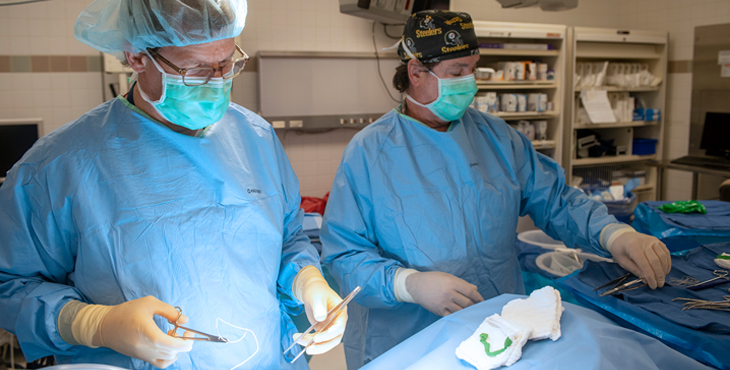A VA-funded study has shown that frail surgery patients may be at higher risk than previously thought. Mortality rates were high for frail patients even after surgeries normally considered low-risk. This led the researchers to conclude that “there are no ‘low-risk’ procedures among frail patients.”
The findings appeared Nov. 13, 2019, in the journal JAMA Surgery.
Frailty refers to overall physical weakness. It is common in older adults. While it is a well-known surgery concern, most of the previous research on frail patients has focused on high-risk surgeries. A surgery is usually considered high-risk when the post-surgery death rate is above 1%.
The researchers looked at data on more than 400,000 Veterans who had non-cardiac surgeries within VA. Out of this group, 8.5% were considered frail and 2.1% were very frail, based on a measure called the Risk Analysis Index (RAI).
“We certainly found it surprising that surgeries usually considered low-stress and low-risk had such high risk of mortality for frail patients.”
Patients were grouped based on what type of surgery they had. Low-risk surgeries included hernia surgery, appendectomy, and cyst removal. Surgeries such as amputation; arterial plaque removal; and knee, shoulder, or hip replacement were considered moderate-risk. High-risk procedures were mostly open surgeries on the aorta, lungs, liver or pancreas.
Mortality rates for frail and very frail patients were “alarmingly high” across all levels of surgery, compared with stronger patients. Thirty days after a low-risk surgery, 1.6% of frail patients and 10.3% of very frail patients had died. Non-frail patients had a 0.22% mortality rate after low-risk surgery.
For moderate-risk surgeries
For moderate-risk surgeries, 5.1% of frail patients and 18.7% of very frail patients died within 30 days. Mortality continued to rise for frail patients as time went on. The highest mortality rate recorded in the study was for very frail patients 180 days after moderate-risk surgery. About 43% of those patients had died.
Frailty remained a significant predictor of mortality regardless of the number of complications a patient had.
The results show that frailty adds significant risk to surgery, say the researchers, even when the surgery is considered minor.
Based on the results, the researchers recommend that patients be assessed using the RAI before any type of surgical procedure. If frailty is found to be a factor, they say, surgeons could focus on pre-operative interventions to address it.
Dr. Daniel Hall, the corresponding author on the paper, is leading efforts to spread preoperative frailty screening in VA. The practice has been implemented in several VA medical centers already. Hall, a researcher at the VA Pittsburgh Healthcare System and the University of Pittsburgh, recently took part in a “Shark Tank” event held by VA’s Diffusion of Excellence program. The VHA Shark Tank Competition offers VA employees the opportunities to share practices that address clinical and operational priorities to improve the Veteran care experience. Through the competition, Hall received bids to implement the frailty screening at several more VA sites, earning Hall’s practice the honor of “Gold Status.”
Topics in this story
More Stories
Diverse representation of women in health care research allows MVP to make discoveries for women’s health
Join the Million Veteran Program online. You will have the option to receive an at-home blood sample collection kit in the mail.
VHA's new podcast series, New Horizons in Health, features a candid discussion of psychedelic assisted therapies for Veterans experiencing mental health conditions.








Dr. Thomas Levy, MD (cardiologist for over 30 years) wrote a book entitled Stop America’s #1 Killer. This book references 650 studies published in peer-reviewed medical / science journals which prove that atherosclerosis (plaque in arteries) is caused by multiple, nutritional deficiencies. On Page 253 Dr. Levy states, “The following supplement regimen is recommended for optimizing the ability of the artery to regenerate itself and reverse any existing atherosclerosis. The typical diet does not even come close to supplying enough of these essential vitamins, minerals and nutrients.” As a person with a family history of heart disease, I have been taking these nutrients for 10 years. At 65 years of age my arteries are “clean as a whistle” (quote from my doctor). I am on a mission to spread the good news.